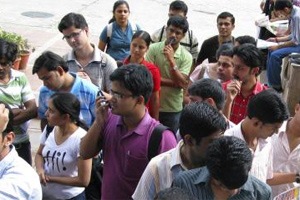Opinion A university at war
Amid political battles and administrative chaos,Bangalore University is virtually imploding.

If you want proof that higher education in India is a great big mess,look no further than Bangalore University. It is a university,not a riot site,and yet you can find hordes of policemen stationed there,looking to quell trouble. It is also the university whose vice-chancellor has sought police protection to walk about and function in his own campus. An ongoing power struggle between the vice chancellor and the registrar of the university has made things worse.
Earlier this week,despite the police throwing a protective ring around him,the vice-chancellor,Prabhu Dev,was hit on the head with a stick by a group of protesting students. The university has seen four protests by different sets of students this month alone. In addition,teachers refused to conduct classes to protest an attack against a colleague,the director of distance education,by a right-wing group.
If the students,teachers and the vice chancellor in one of the countrys large and better-known universities are all stirred up,it heralds the worst of times for the institution. All academic activity has come to a stop.
Mind you,this is the city to which much of India migrates in search of a good education. Its colleges have applicants from the far corners of India and even overseas. Even the Chinese come to Bangalore to learn English and get themselves degrees in areas like engineering and computer applications. Bangalore University is one of Indias oldest,its origins dating back to 1886 when the British government launched it as Central College. It was named Bangalore University in 1964 to consolidate the citys higher education institutions. In its heyday,the university had illustrious students like Nobel laureate C.V. Raman,who was a researcher at the university,and technocrat Bharat Ratna M. Visweswaraiah. More recently in 2001,the university was accorded five star status by the National Assessment and Accreditation Council of the University Grants Commission.
But today the university is in a state of disarray. Examinations and revaluations are the sticking points for the students. Rural students complain of lack of access to revaluation facilities. Students are yet to receive marks cards years after exams have been held. Some students are still waiting for revaluation results three years after applying. Others complain of discrepancies in their marks cards,including being marked absent for examinations and being wrongly awarded marks in single digits.
When students sloganeer,We want justice, and the vice-chancellor describes the circumstances as mafia-like,the situation is clearly very dire.
Here is one instance of apparently chaotic administration by the university. Some exams held in August this year in certain subjects of the distance learning undergraduate and graduate courses were declared null after wide accounts of malpractice. A new date for re-examination was announced,December 14,. But the exam was not held because some of the centres had not installed closed-circuit TVs to check malpractice as mandated by the university. The students allege that the university is playing with their future with such muddled actions.
A television channel exposed the sorry state of the 200 students enrolled for Bangalore Universitys recently launched four-year integrated science course. These students make do with a guest house instead of proper space on the campus. Their chemistry lab does not have a single piece of equipment,their physics lab has only benches and its library is filled with rows of beds.
In the past years,several complaints of malpractice were received about the process of selection and awarding Ph.Ds. Finally this year,in an attempt to elevate the standards of its 64 Ph.D streams,the university recently held an entrance exam and took it online. Over 1,500 students appeared. Only 19 per cent managed to get through.
The university should have rightfully been a feeder for the proliferation of Indian and multinational corporations based in the city. Instead,it has become an arena for power play between right-wing and other political interests,while administrators with suspect motives further their own agendas.
saritha.rai@expressindia.com





